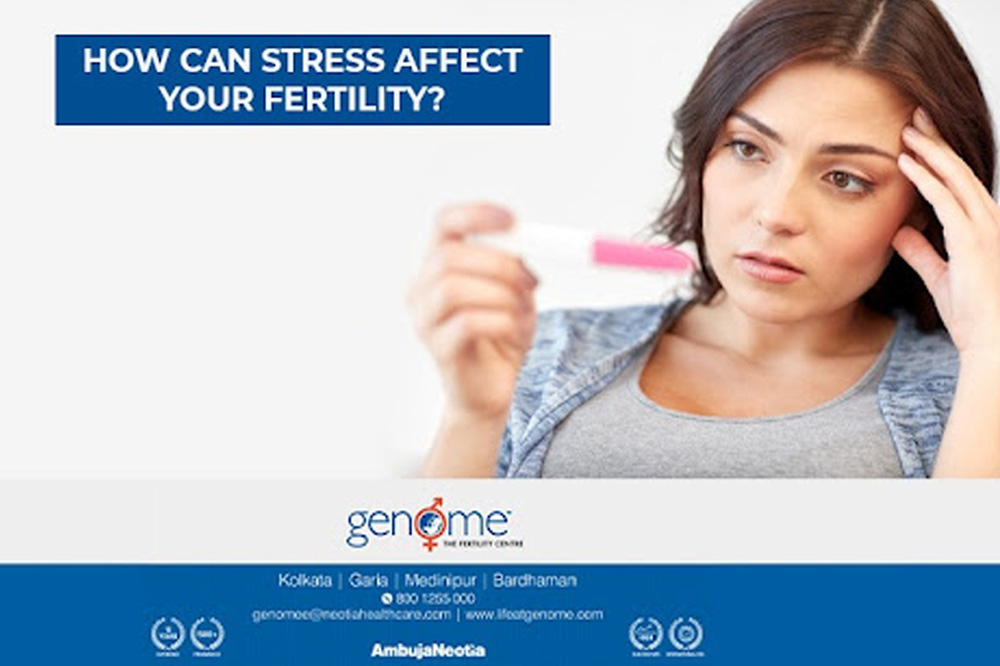How Can Stress Affect Your Fertility?
Stress and other mental conditions are not that easy to manage, and can often come up while you are dealing with infertility.
The idea behind conceiving is to “relax”. However, the reality is more complex.
Whether stress can directly affect getting pregnant is relatively unknown. But one thing is for sure – stress can make it harder to conceive.

The opposite is also true – dealing with infertility can cause your stress levels to rise.
In this article, we shall try to unwind the relationship between stress and infertility.
We shall also discuss some possible ways to tackle stress effectively and reduce its impact on conception.
Stress and Fertility
Various studies have found a link between high-stress levels and lowered fertility rates. Periods of stress aren’t good times to have a baby.
Stress hormones such as cortisol upset the signalling between the ovaries and brain, allowing the ovulation to trip up.
Infertile women are found to be more stressed than those who are fertile. The fertility treatment itself can add to the stress experienced by the couple.
Moreover, stressed people also have intercourse less often.
They also get addicted to smoking or alcohol, which again impacts fertility negatively.
The success of assisted reproductive technologies, like IVF, may also be affected by an individual’s stress levels.
Hence, couples are likely to experience parenthood when they are happy and relaxed.
One thing to note here is that stress impacts couples in distinct ways. Therefore, the levels of implications of stress on fertility processes are unsettled.
Lifestyle, Stress and Infertility
Stress can lead to unhealthy behaviours which, in turn, can impact fertility. For instance, it can cause you to:
Either perform no or too much exercise:
Regular and healthy amount of exercise is known to lessen stress levels.
It can also facilitate proper weight balance and reduce your obesity chances, which are major factors behind infertility problems.
Just ensure not to stick yourself with an intense workout. This can have negative impacts on your fertility. Strike the right balance in your workout schedule.
A 15-30 minute daily exercise routine can be the way forward for starters.
Drink too much alcohol:
Stress is a major contributor to drinking alcohol. Habitual drinking can even decrease sperm count.
Hence, drinking alcohol or smoking are big “Nos” when you are struggling to become a parent.
To be on the safe side, avoid drinking even a little amount of alcohol while trying to conceive.
Consume too much caffeine:
Too much caffeine intake everyday can have negative consequences on your conception, especially if you are already dealing with fertility issues.
You can consult your healthcare expert about the possible effects of caffeine on your fertility health. One can even replace their daily intake of tea/coffee withaherbal drink.
Face sleep disorders:
If your lifestyle includes late nights with early wake-up calls, then you might be in the position to experience fertility issues sooner or later.
Hence, working on a sleep schedule and sticking to it can help. Ensure your night and morning are completely devoid of caffeine.
Instead, you can have a cup of herbal drink just before bed.
Experience difficulty while practising healthy eating habits:
People with high-stress levels tend to indulge in unhealthy eating habits. This leads to weight gain and obesity issues, that are known to augment the odds of infertility.
Many people, on the other hand, lose appetiteunder stress. This causes a reduction in the intake of vital nutrition that is necessary for good fertility health.
Nutrition specialists recommend avoiding extreme diet plans that promote the dismissal of the entire food groups.
Just follow the right balance of essential nutrients and you are good to go.
How can you Tackle Fertility Stress?
Once in a while stress is normal. It won’t damage your conception abilities.
What strikes hard on your fertility is the long-term stress or any other major upheaval, such as financial problems or the death of a close one.
Stress can be curbed through various means. Have a look at some of them below:
- Talk with a therapist to better reframe your feelings.
- You can also talk to other people who are coping with infertility. Try to discuss each other’s concerns and understand possible treatment solutions.
- Communicate with your partner and share your emotions with him/her. Talk about differences and prevent any conflict.
- Practice relaxation techniques. These include progressive deep breathing, muscle relaxation, meditation, etc. All of these can help you transit to a relaxingresponse state.
- Improve your health: Proper food intake and the right exercise are essential ways of keeping your health in a good state. Get good sleep and make space for recreation as well.
Final words
To feel at ease from feeling stressed, you can seek the support of a therapist. While it may not directly improve your fertility concerns, but will reduce your stress levels.
This will allow you to make healthier lifestyle choices and let your reproductive health flourish positively.
In the end, you must have a look at your daily stress factors and seek out solutions to relieve all or some of them.
Disclaimer
Though all attempts are made to provide correct information on the subject, inadvertent & typographical errors arising out of manual intervention cannot be ruled out. It is requested to bring any such discrepancies to the notice of the blogger for correction.